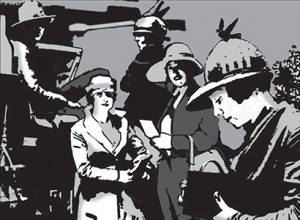
Striking telephone operators in front of PT&T’s Bush Street headquarters in San Francisco. From left are: Rena Smith, Valeria Stewart, Helen Caldera, Josephine Duff y and Hazel Petteys, who is holding a camera to shoot pictures of scabs crossing the picket line. Graphic based on Chronicle photo, June 20, 1919
When the First World War ended in November of 1918, electrical workers and telephone operators on the Pacific Coast resumed their quest for better wages and working conditions. PT&T had routinely ignored the agreement mediated by the Federal Government at the start of the war. Workers were ready to go back on the offensive.
IBEW faced not one but two hostile parties at the bargaining table: PT&T, and also the Federal government, which still had wartime authority over labor-management relations in the phone industry. IBEW’s top officers scheduled a national strike for mid-June, 1919, then tried to call it off at the last minute. In a mostly spontaneous uprising, IBEW members in California walked out anyway.
Pickets were organized to stand watch at telephone exchanges throughout the state. Other labor unions pitched in with moral and financial support. “Society women” in San Francisco organized several mass meetings in support of the operators. City leaders from Fresno to Berkeley to Reno offered political support.
The IBEW International office reversed course and ordered electrical workers in Oregon and Washington to join the strike. As many as 12,000 telephone operators and 6,000 electrical workers were out at the height of the strike. IBEW locals in Oakland and San Francisco even discussed holding sympathy strikes at PG&E and other electric utilities.
When PT&T made concessions at the bargaining table in July, IBEW put a tentative agreement out for a vote. But IBEW members badly misjudged the situation and voted it down, allowing the company to disown the agreement altogether and walk away from negotiations.